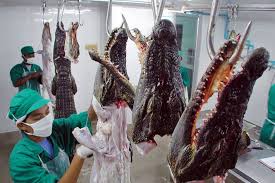Sofala is ready to export crocodile meat to China
 Crocodile farmers in Sofala province expect to start exporting crocodile meat to Asia as soon as a license is issued by the Provincial Veterinary Services.According to Zita Guimarães, administrator of Agripec, a local company farming more than 26,000 crocodiles in facilities on the outskirts of Beira, there is annual export capacity potential of 30 to 50 tons of the meat, especially the tail.The crocodile meat is described by nutritionists as rich in protein, and has begun to find a following locally, with Agripec selling more than five tons this year alone. The company, founded in 2008, will export around 3,000 crocodile skins to Portugal, Italy, Japan and South Korea this year.The company finds its fixed annual quota of 2,000 eggs along the Zambezi River, particularly in the districts of Chemba, Caia and Marromeu, and last year captured a total of 80 live crocodiles. This year, the Pungue and Buzi rivers were also targeted in an attempt to reduce the attacks that harass the riverside communities.The reptiles consume about a ton and a half a day of a diet which includes beef, chicken and cockroaches. The largest specimen in captivity is called Guimarães, weighs more than a ton, and is over five metres in length.According to the farmers, the captive crocodiles are no longer dangerous to humans, and a Notícias reporter reputedly saw crocodiles answering to their names for their first meal of the day. Prime Minister Carlos Agostinho do Rosário however described the activity as high risk during a recent working visit, while conceding that the crocodile ‘rissóis’ (patties) he sampled could serve as Mozambican flagship dish abroad once authorization for their export is granted.
Crocodile farmers in Sofala province expect to start exporting crocodile meat to Asia as soon as a license is issued by the Provincial Veterinary Services.According to Zita Guimarães, administrator of Agripec, a local company farming more than 26,000 crocodiles in facilities on the outskirts of Beira, there is annual export capacity potential of 30 to 50 tons of the meat, especially the tail.The crocodile meat is described by nutritionists as rich in protein, and has begun to find a following locally, with Agripec selling more than five tons this year alone. The company, founded in 2008, will export around 3,000 crocodile skins to Portugal, Italy, Japan and South Korea this year.The company finds its fixed annual quota of 2,000 eggs along the Zambezi River, particularly in the districts of Chemba, Caia and Marromeu, and last year captured a total of 80 live crocodiles. This year, the Pungue and Buzi rivers were also targeted in an attempt to reduce the attacks that harass the riverside communities.The reptiles consume about a ton and a half a day of a diet which includes beef, chicken and cockroaches. The largest specimen in captivity is called Guimarães, weighs more than a ton, and is over five metres in length.According to the farmers, the captive crocodiles are no longer dangerous to humans, and a Notícias reporter reputedly saw crocodiles answering to their names for their first meal of the day. Prime Minister Carlos Agostinho do Rosário however described the activity as high risk during a recent working visit, while conceding that the crocodile ‘rissóis’ (patties) he sampled could serve as Mozambican flagship dish abroad once authorization for their export is granted.
0 comentários:
Post a Comment